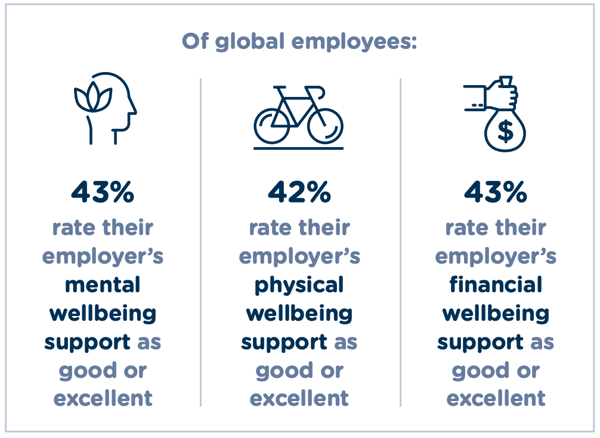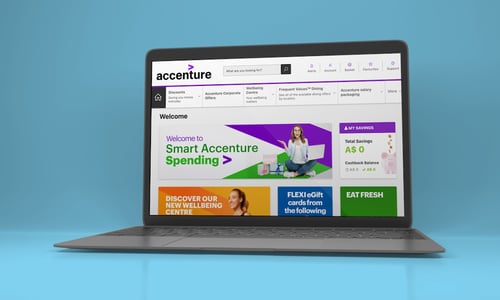How much does your organization stand out from its competition? That’s a question on many minds of HR leaders, especially in a tricky talent market. The unemployment rate in the U.S. dropped from 3.7% in March 2022 to 3.4% in April 2023, amounting to approximately 5.7 million Americans. And while there are over 360,000 Americans who believe there aren’t any jobs available for them, more than 250,000 jobs were filled in April 2023 alone.
To brand yourself as an employer of choice takes work – there’s no doubt about that. But how you choose to define your Employee Value Proposition can make or break your talent acquisition strategy. To quickly define, your EVP is the unique set of benefits that an employee receives in return for the skills, capabilities, and experience they bring to your company. Defining your EVP is about defining the essence of your company – what makes it special and why people choose to work there.
But market leaders understand that your EVP isn’t just about what you give your people, it’s about how those benefits, initiatives or freebies make your people feel about belonging at your organization.
As you develop your overall EVP it’s key to understand the goals behind an EVP and what it allows you to do as a business. With the right EVP in place, you’ll be able to:
- Package and promote your unique benefits to your workforce
- Align your EVP with your employer brand
- Enhance recruitment and talent acquisition strategies
- Increase employee retention and engagement
- Improve your position as an employer of choice
To help you get started, here are four steps to develop your EVP throughout the employee experience.
Step 1: Discover
 As with many projects, your first phase will be the Discovery phase, which will help you map out what you’ll need to draft your EVP and offerings. To look inwards, you could conduct an annual survey to gain feedback from your people or, my own preferred method, deliver more pulse-style eNPS surveys to get more in-the-moment feedback. Ask your employees how they feel about your company, whether they’d recommend you, and what stands out about your current offerings. What do they think is missing? The interesting part about this stage is discovering gold mines of information that can challenge your assumptions.
As with many projects, your first phase will be the Discovery phase, which will help you map out what you’ll need to draft your EVP and offerings. To look inwards, you could conduct an annual survey to gain feedback from your people or, my own preferred method, deliver more pulse-style eNPS surveys to get more in-the-moment feedback. Ask your employees how they feel about your company, whether they’d recommend you, and what stands out about your current offerings. What do they think is missing? The interesting part about this stage is discovering gold mines of information that can challenge your assumptions.
For example, is there a benefit you put in place that you thought was exciting, yet your employees aren’t aware of it at all?
Step 2: Define
 Next, define what you want to be known for in the labor market. To help define this vision, I suggest starting with what’s already out there to see how aligned your vision is with what people are already thinking. You can look at your own company coverage by setting up a Google alert for the name of your company (you’ll receive instant email notifications whenever your company is mentioned) and looking at employee reviews (especially on your benefits package) on review sites such as Glassdoor and Indeed.
Next, define what you want to be known for in the labor market. To help define this vision, I suggest starting with what’s already out there to see how aligned your vision is with what people are already thinking. You can look at your own company coverage by setting up a Google alert for the name of your company (you’ll receive instant email notifications whenever your company is mentioned) and looking at employee reviews (especially on your benefits package) on review sites such as Glassdoor and Indeed.
Keep a close eye on recent leavers who may have spoken up about what they wish the company had focused on. You can also look at your own social media properties, such as Twitter, LinkedIn and even TikTok to see how people are engaging with your overall employer brand.
Taking these pieces into consideration can give you a benchmark to start from so you can continue to mark progress – for example, your Glassdoor star rating or your number of followers on social channels.
Step 3: Package
When you’re packaging up your offerings, this is where I like to put my marketing hat on and steal from tactics from my colleagues. Your benefits can fall under three categories to help your employees really understand what you’re offering: economic, cultural and regulatory.
 In the economic category it’s all about procuring services for less than it would cost you to give the equivalent in salary, benefits programs that offer your people cost savings, like the one Reward Gateway offers, can be a great choice because they enable all employees regardless of stage in life the ability to amplify their income.
In the economic category it’s all about procuring services for less than it would cost you to give the equivalent in salary, benefits programs that offer your people cost savings, like the one Reward Gateway offers, can be a great choice because they enable all employees regardless of stage in life the ability to amplify their income.
Cultural benefits help make a statement about your culture and support you to drive behaviors you want. Wellbeing is probably the most talked about and in-demand “cultural” benefit in today’s world because we know that physical and emotional wellbeing is key to our employees feeling supported and engaged at work.
Our Employee Engagement Trends Report, released earlier this year, highlights the lack of support in all three wellbeing pillars from U.S.-based employers:

Of course, things that save our people time like an onsite kitchen or café, free breakfasts and even concierge services can support your people to get more of their workday, which equates to the precious gift of more time at home with family and friends.
And then regulatory benefits like annual leave programs give you the opportunity to create policies that support your cultural “storybook.” Engaged cultures see lower levels of absenteeism and how we present leave opportunities can add more value and speak to the company culture more positively.
Step 4: Promote!
On top of packaging up your EVP into ways that will resonate with your people, the last step is to promote your EVP and all of your offerings so you can gain high engagement. Shout it from the rooftops and make it easy for your employees to access, understand and engage with your benefits.
 Accenture, globally recognized professional services and consulting firm, partners with Reward Gateway to bring elements of Accentures financial benefits package to life. They're using the best of their employer brand and color palette here to create a uniquely Accenture ‘home’ for all employee benefits ensuring they’re easy to access and easy to use for all employees.
Accenture, globally recognized professional services and consulting firm, partners with Reward Gateway to bring elements of Accentures financial benefits package to life. They're using the best of their employer brand and color palette here to create a uniquely Accenture ‘home’ for all employee benefits ensuring they’re easy to access and easy to use for all employees.
In its platform, the team highlights some of their key benefits like childcare services and gym memberships alongside their teams’ most-loved discounts categories from the benefits platform, such as Travel & Hotels and Health and Wellbeing. By promoting everything in one place with a strong brand presence, technology makes it easy for the team to market and promote the suite of services as part of their total rewards strategy.
There you have it, the four steps to kick off your own EVP journey. Found this interesting? Download one of my favorite eBooks with ways to build a future-proof EVP.
And of course, if you want to know how to put in place an impactful, meaningful program to save your employees money and make them feel appreciated in a challenging environment, book in a 15-minute call with the Reward Gateway team.

%20(1).jpeg) Alexandra Powell
Alexandra Powell

